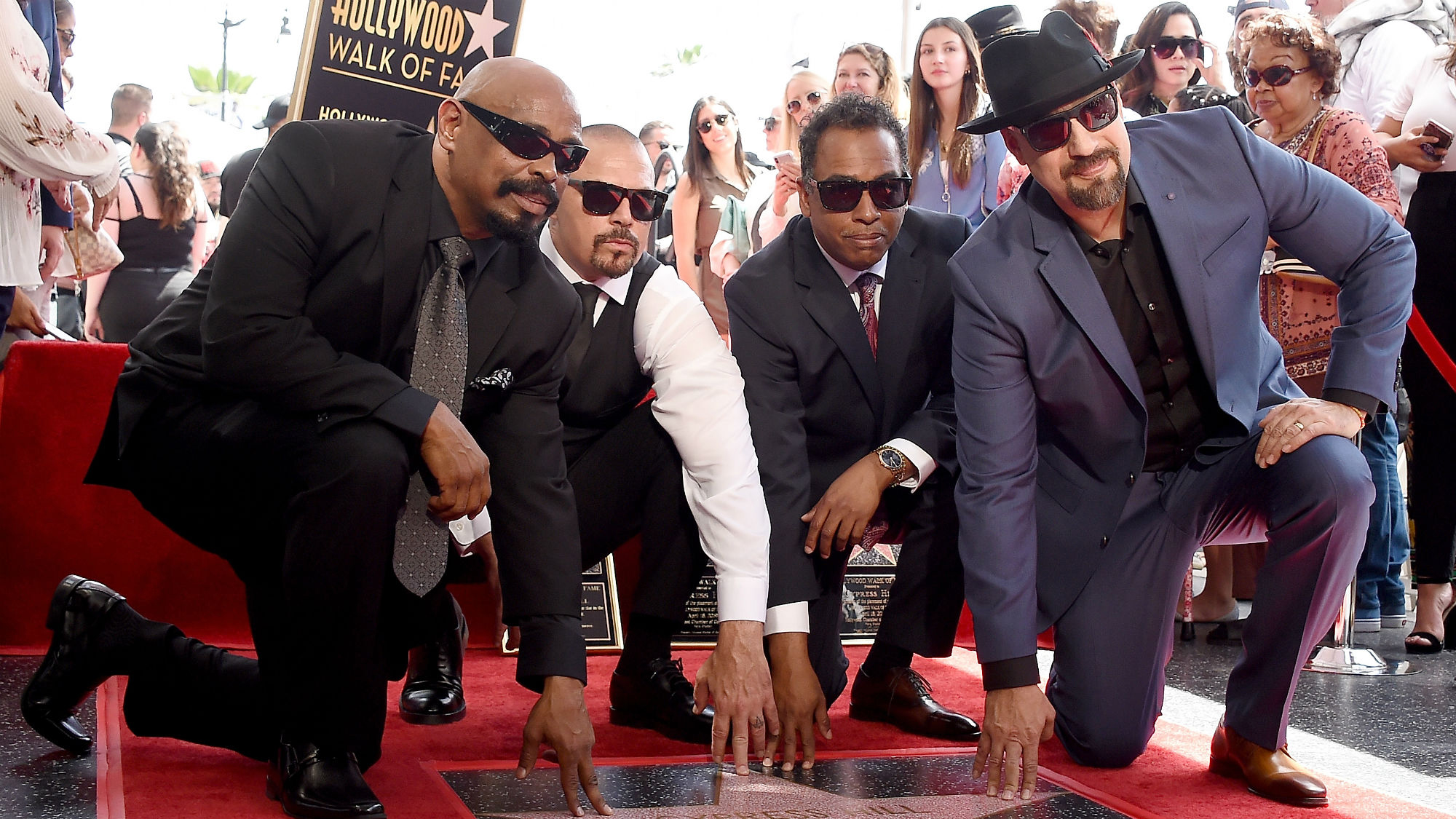
Cypress Hill & Atmosphere at Red Rocks Amphitheatre
Artist Biography by Stephen Thomas Erlewine
Cypress Hill were notable for being the first Latino hip-hop superstars, but they became notorious for their endorsement of marijuana, which actually wasn’t a trivial thing. Not only did the group campaign for its legalization, but their slow, rolling bass-and-drum loops pioneered a new, stoned funk that became extraordinary influential in ’90s hip-hop — it could be heard in everything from Dr. Dre‘s G-funk to the chilly layers of English trip-hop. DJ Muggs crafted the sound, and B Real, with his pinched, nasal voice, was responsible for the rhetoric that made them famous. The pro-pot position became a little ridiculous over time, but there was no denying that the actual music had a strange, eerie power, particularly on the band’s first two albums. Although B Real remained an effective lyricist and Muggs‘ musical skills did not diminish, the group’s third album, Temples of Boom, was perceived by many critics as self-parody, and the group appeared to disintegrate shortly afterward, though Muggs and B Real regrouped toward the end of the ’90s to issue more material.
DVX, the original incarnation of Cypress Hill, formed in 1988 when Cuban-born brothers Sen Dog (born Senen Reyes, November 20, 1965) and Mellow Man Ace hooked up with fellow Los Angeles residents Muggs (born Lawrence Muggerud, January 28, 1968) and B Real (born Louis Freese, June 2, 1970). The group began pioneering a fusion of Latin and hip-hop slang, developing their own style by the time Mellow Man Ace left the group in 1988. Renaming themselves Cypress Hill after a local street, the group continued to perform around L.A., eventually signing with Ruffhouse/Columbia in 1991.
 With its stoned beats, B Real‘s exaggerated nasal whine, and cartoonish violence, the group’s eponymous debut became a sensation in early 1992, several months after its initial release. The singles “How I Could Just Kill a Man” and “The Phuncky Feel One” became underground hits, and the group’s public pro-marijuana stance earned them many fans in the alternative rock community. Cypress Hill followed the album with Black Sunday in the summer of 1993, and while it sounded remarkably similar to the debut, it nevertheless became a hit, entering the album charts at number one and spawning the crossover hit “Insane in the Brain.” With Black Sunday, Cypress Hill‘s audience became predominantly white, collegiate suburbanites, which caused them to lose some support in the hip-hop community. The group didn’t help matters much in 1995, when they added a new member, drummer Bobo, and toured with the fifth Lollapalooza prior to the release of their third album, Temples of Boom. A darker, gloomier affair than their first two records, Temples of Boom was greeted with mixed reviews upon its fall 1995 release, and while it initially sold well, it failed to generate a genuine hit single. However, it did perform better on the R&B charts than it did on the pop charts.
With its stoned beats, B Real‘s exaggerated nasal whine, and cartoonish violence, the group’s eponymous debut became a sensation in early 1992, several months after its initial release. The singles “How I Could Just Kill a Man” and “The Phuncky Feel One” became underground hits, and the group’s public pro-marijuana stance earned them many fans in the alternative rock community. Cypress Hill followed the album with Black Sunday in the summer of 1993, and while it sounded remarkably similar to the debut, it nevertheless became a hit, entering the album charts at number one and spawning the crossover hit “Insane in the Brain.” With Black Sunday, Cypress Hill‘s audience became predominantly white, collegiate suburbanites, which caused them to lose some support in the hip-hop community. The group didn’t help matters much in 1995, when they added a new member, drummer Bobo, and toured with the fifth Lollapalooza prior to the release of their third album, Temples of Boom. A darker, gloomier affair than their first two records, Temples of Boom was greeted with mixed reviews upon its fall 1995 release, and while it initially sold well, it failed to generate a genuine hit single. However, it did perform better on the R&B charts than it did on the pop charts.
 Instead of capitalizing on their regained hip-hop credibility, Cypress Hill slowly fell apart. Sen Dog left in early 1996 and Muggs spent most of the year working on his solo album. Muggs Presents the Soul Assassins was released to overwhelmingly positive reviews in early 1997, leaving Cypress Hill‘s future in much doubt until the release of IV in 1998. Sen Dog had come back for the record. He had left because he felt he did not get enough mike time, but after a few years with a rock band he was more than happy to return. Two years later, the group released the double-disc set Skull & Bones, which featured a disc of hip-hop and a disc of their more rock-inspired material. Appropriately, the album also included rock and rap versions of the single “Superstar,” bringing Cypress Hill‘s quest for credibility and crossover hits full circle. The ensuing videos for both versions featured many famous rap and rock musicians talking about their profession, and the song was a smash on MTV because of it. In the winter of 2001, the group came back with Stoned Raiders, another album to heavily incorporate rock music. Three years later, the band issued ‘Til Death Do Us Part, which incorporated several styles of Jamaican music. In 2010 they announced their signing to Priority Records thanks to the label’s creative director Snoop Dogg. The label released their eighth studio album, Rise Up, that same year. It would be eight years until the group returned with new material, but in 2018 they came back with Elephants on Acid. The album was the first to be produced by DJ Muggs since 2004’s ‘Til Death Do Us Part, and the first taster of the record came in the form of the psychedelic track “Band of Gypsies.”
Instead of capitalizing on their regained hip-hop credibility, Cypress Hill slowly fell apart. Sen Dog left in early 1996 and Muggs spent most of the year working on his solo album. Muggs Presents the Soul Assassins was released to overwhelmingly positive reviews in early 1997, leaving Cypress Hill‘s future in much doubt until the release of IV in 1998. Sen Dog had come back for the record. He had left because he felt he did not get enough mike time, but after a few years with a rock band he was more than happy to return. Two years later, the group released the double-disc set Skull & Bones, which featured a disc of hip-hop and a disc of their more rock-inspired material. Appropriately, the album also included rock and rap versions of the single “Superstar,” bringing Cypress Hill‘s quest for credibility and crossover hits full circle. The ensuing videos for both versions featured many famous rap and rock musicians talking about their profession, and the song was a smash on MTV because of it. In the winter of 2001, the group came back with Stoned Raiders, another album to heavily incorporate rock music. Three years later, the band issued ‘Til Death Do Us Part, which incorporated several styles of Jamaican music. In 2010 they announced their signing to Priority Records thanks to the label’s creative director Snoop Dogg. The label released their eighth studio album, Rise Up, that same year. It would be eight years until the group returned with new material, but in 2018 they came back with Elephants on Acid. The album was the first to be produced by DJ Muggs since 2004’s ‘Til Death Do Us Part, and the first taster of the record came in the form of the psychedelic track “Band of Gypsies.”
